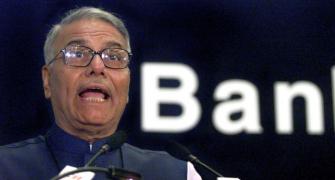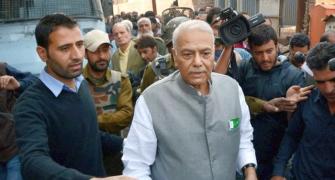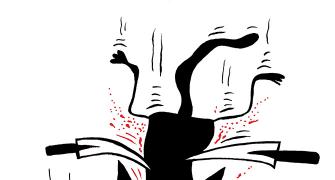By castigating the reforms themselves because of the remediable and reversible defaults here and there in carrying them out, Yashwant Sinha is throwing out the baby along with the bath water, says B S Raghavan.

Photograph: Subhav Shukla/PTI Photo.
Veteran BJP stalwart, and a former finance minister to boot, Yashwant Sinha, has thrown a veritable stink bomb at both Prime Minister Narendra Modi and Finance Minister Arun Jaitley.
He must have known that thereby he would ignite a nationwide commotion both on his motives and the merits of his contentions.
Not many may know or remember that before he joined politics, Yashwant Sinha was a member of the IAS for 24 years, and earned the respect of his peers for his noticeable professional calibre and competence. I had a passing acquaintance with him at the time and formed a very good impression of his sharpness of mind and intellectual integrity.
Based on that judgement, I have a reasonable certitude that he would say nothing merely to settle personal scores or to vent his spleen out of sordid motives against his own colleagues in the Bharatiya Janata Party. What he has said must have come out of his conviction and from his heart.
For instance, he has hit the bull’s eye with his well-deserved criticism of the over-burdening of Arun Jaitley with the heavyweight ministries of finance and defence, along with the department of disinvestment and the ministry of corporate affairs.
As Sinha puts it, in the best of times, finance ministry calls for the undivided attention of whoever is in charge of it, if the job has to be properly done. In challenging times such as these, it becomes more than a 24x7 job.
Such is the case with the defence ministry as well. In fact, since it is the fulcrum of national security, it was inexcusably imprudent on the part of the prime minister to have made it for so long the appendage of Arun Jaitley’s other responsibilities. Under these conditions, it was impossible to do full justice to any of the four portfolios entrusted to him.
This certainly was one of the principal reasons why the government cut a sorry figure in the handling of the implementation of demonetisation and the GST, or faced strictures from the Comptroller and Auditor General of India and the armed forces veterans for dangerous deficiencies in defence preparedness.
In regard to the economy, the litany of features Sinha considers disturbing is long: Shrinkage in private investment, “collapse” of industrial production, doldrums in agriculture and construction industry, fall in exports, loss of “countless millions” of jobs with scanty creation of new jobs, and a new low of 5.7 per cent in the growth rate, which would have actually been 3.7 per cent or even less but for the recently introduced change in the methodology of computation.
Among the specifics he has given, are the bankruptcy proceedings against 40 leading companies of the country, with the possibility of many more joining them, the “existential crisis” suffered by the small and medium enterprises (SME) sector and the “whopping” Rs 65,000 crore input tax credit demand under the GST against a collection of Rs 95,000 crore.
According to Sinha, all these cumulatively add up to “an unmitigated economic disaster”. Taking a dig at the prime minister for saying that he has seen poverty from close quarters, Sinha sarcastically concludes that ‘his finance minister is also working over-time to make sure that all Indians see it from equally close quarters.”!
Curiously, as part of the calamitous picture he has painted, Sinha also brings in a condemnation of the “raid raj” unleashed by the income tax department, the Enforcment Directorate and the CBI, saying that “instilling fear in the minds of the people is the name of the new game”.
Coming from a prominent figure like Yashwant Sinha, his statements needed a prompt rejoinder from the government. Any government keen to safeguard its credibility would have come out with a comprehensive overview of the economy constituting an authoritative rebuttal of Yashwant Sinha’s charges in the form of a media statement or media meet by someone like the chief economic adviser or the finance minister himself.
Unfortunately, in line with so many other past instances of indifference to public censure, there has so far been no reaction from the Modi government, other than Arun Jaitley’s cheap jibe at a book release function calling Sinha a “job applicant at 80”, and Jayant Sinha’s watery defence of the “robust new economy for a New India” without answering the specifics in his father’s article.
The government has thus needlessly allowed the likes of P Chidambaram and the malcontents on various counts against Modi and his government to have a field day.
It must not be forgotten that Chidambaram, for all the rough patch he is going through following his son having come under the scanner of the Enforcement Directorate and the Central Bureau of Investigation, still enjoys high standing as a master craftsman of national Budgets. In fact, Sinha’s attack on “raid raj” would have particularly pleased him.
The result is that the government has lost a golden opportunity to make out a convincing case in defence of its performance in managing the economy. For, it is not without a defensible record.
It could have easily established how Sinha’s use of expressions such as “collapse”, “unmitigated disaster” and the like are instances of overkill on his part and how they are inapplicable to the present situation.
For starters, while, in the past, governments had been dealing with different aspects of the economy in a piecemeal manner, the Modi government has, for the first time, brought in the holistic concept of total economic management of which Make in India, Digital India, Skills India, financial inclusion, promotion of competitiveness and ease of doing business, war on sleaze, fraud and corruption, General Service Tax, bankruptcy law and other allied reforms form vital and essential ingredients.
They have all been set in motion within a period of three years, and will necessarily be fraught with glitches in implementation on the one hand, and on the other, pains of structural adjustment on the part of individuals and businesses.
The government should be judged not by these inevitable concomitants of the reforms process, but by its earnestness to get on top of them. Judged by this yardstick, the government has certainly a good account to give of itself.
By castigating the reforms themselves because of the remediable and reversible defaults here and there in carrying them out, Yashwant Sinha is throwing out the baby along with the bath water.
Even on the concrete aspects of the economy, the picture is not one of “unmitigated disaster”.
According to the latest Business Outlook Survey by the Confederation of Indian Industry, the Business Confidence Index has hit an all-time high in the January-March quarter, driven by a significant improvement in present as well as future business prospects.
The industrial outlook survey of the manufacturing sector for the December quarter by the Reserve Bank of India released earlier this month shows there is substantial improvement in sentiment on demand conditions, with respondents more optimistic about production, order books and capacity utilisation in the December quarter than a quarter ago.
On the effects of demonetisation on micro, small and medium enterprises, the August-October 2017 issue of the International Journal of Advanced Studies published by the Pune Research Discovery has stated that while the initial phase of liquidity crunch could have caused a slowdown in economic activity, ‘In the medium and long-term, however, there is reason for optimism. The inflow of deposits should logically allow for lower interest rates, spurring investment in this sector. Further, the shift towards cashless transactions will encourage registration among such enterprises and allow them to benefit from central and state schemes and incentives. The access to low cost capital should also improve if there is a significant shift to a digital and cashless economy.’
It is on the employment generation front that the government has to redouble its efforts. Official figures are not available, but going by the CII’s guesstimate, the number of jobs created has lagged far behind the estimated one million people who are entering the workforce every month.
Altogether the big picture is one of an economy which is capable of fast recovery and maintaining its tempo. What is important is for the government to stay its course, the state governments to play their role in a spirit of synergistic cooperation, and for the critics, like Yashwant Sinha, not to mislead the people.
B S Raghavan is a former member of the Indian Administrative Service who has served as the commerce and industry secretary and chief secretary of a state and headed four major public sector enterprises.









